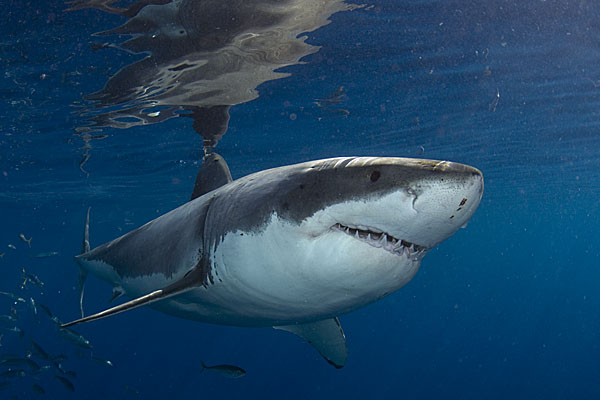Sharks are often thought of in terms of superlatives, and perhaps no species has racked up as many “mosts” as the Great White Shark, Carcharodon carcharias. This is the star of “Jaws” after all, and probably the species most people who aren’t devoted to being familiar with fish visualize when they hear the word “shark.” Thanks to new research by Marra and friends (2019), we’re becoming familiar with the White Shark on the most basic level of all: the genetic level.
Not every species has had its entire genome decoded, and the White Shark is one of only a handful shark species to get this level of attention. The Whale Shark and the Elephant Shark (actually a species of chimera) have also had their genetic codes mapped, providing a couple of fairly closely-related species for comparison. By comparing the full genome of the White Shark with these other shark species and other vertebrates, the authors were able to identify specific mutations that have stood the tests of time and natural selection. Many of these genes are associated with the very traits that have made sharks such incredible survivors for going on 450 million years.

One of the first things that Marra and colleagues found was that the White Shark genome is huge, with over 1.5 times the number of base pairs found in us puny humans. Within that big genome, a large proportion of the genes (nearly 60 %) are duplicates. Many of the repeated genes are in a group called transposable elements, which are capable of “jumping” to different areas of the genome. These elements play a role in activating and expressing other parts of the genome, but when things go wrong they can cause harmful mutations that lead to genetic diseases including cancer.
This would seem at first glance to contradict the bullet-proof reputation of the shark immune system. Modern-day snake oil salespeople have made a cottage industry out of the idea that sharks don’t get cancer, but here’s the most famous shark of all carrying around a bunch of extra genes that, while very useful, could actually increase the chance of getting cancer. At its most basic level, cancer is a consequence of living long enough to build up harmful mutations over a lifetime of random gene replication accidents until one of those mutations finally causes a group of cells to grow and reproduce out of control. Being large-bodied, long-lived, and carrying around a bunch of jumping genes would seem to be three strikes against White Sharks being as cancer-resistant as their reputation would suggest. In fact, sharks do get cancer, but at least anecdotally they seem to have fairly low rates of it.

The White Shark’s genome reveals at least some of the mechanisms behind their seeming resistance to cancer. Their genetic code is loaded with a wide variety of adaptations for genetic stability, including ways of repairing damaged genes and triggering death in cancer cells. Marra and friends suggest that these adaptations in White Sharks may be driven by their long lives and huge, highly mutable genomes. White Sharks definitely get cancer, but they’re armed to the proverbial teeth to take it on. Many of these same genes were also found in Whale and Elephant Sharks, suggesting that these traits may be widespread among cartilaginous fishes.
In addition to their ability to keep their own genetic code under control, White Sharks pack a lot of genes related to healing wounds coming from outside their body. These include genes related to blood coagulation, growing new blood vessels, and growing new skin. These likely all play roles in the Wolverine-like ability of sharks to survive and recover from absolutely horrendous injuries, in some cases barely showing evidence of having been injured in the first place. Marra and friends also took a look at parts of the White Shark genome related to their infamous sense of smell, but didn’t find evidence of sharks having any more of the typical genes devoted to following their nose than many other vertebrates. However, they did find evidence that sharks may make use of alternative families of genes related to olfaction, so may just be operating on a different level entirely when it comes to smell.
There’s a lot of exciting stuff in the White Shark genome and still plenty to be found. It will be interesting to see how widespread some of these adaptations are in other sharks and rays as more species have their genetic sequences decoded. While much has been made regarding the potential for cancer resistance built into the White Shark genome, it should be stated that these conclusions do not support the use of shark cartilage supplements and other pseudoscience related to sharks and cancer (if you eat a part of a shark all you’re going to do is digest it). However, the adaptations found in the White Shark may be promising as inspiration for developing genetic therapy methods. Until then, we can appreciate the superpowers of Carcharodon carcharias for keeping the celebrity shark swimming in the ocean and in our hearts.
Marra and friends (2019) White shark genome reveals ancient elasmobranch adaptations associated with wound healing and the maintenance of genome stability. DOI: 10.1073/pnas.1819778116